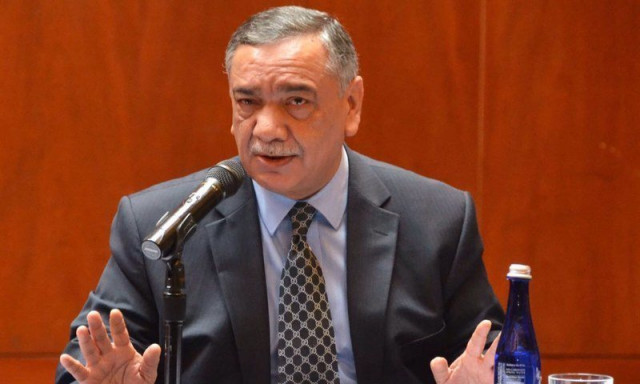Model courts set up for conducting day-to-day trial
CJP says discussions to finalise model to be concluded in a few days

CJP Asif Saeed Khosa. PHOTO: SC
The CJP said that discussions on which model could be adopted nationwide should conclude in a few days.
A meeting of National Judicial Policy Making Committee (NJPMC) under the chairmanship of CJP Khosa was held on Monday, wherein all chief justices of high courts and others were present. NJPMC is the highest committee of top judges to bring judicial reforms in the country.
During the meeting, the chief justice said that under Article 37 (d) of the constitution, the provision of expeditious and inexpensive justice is ensured. Therefore, in-line with the said constitutional mandate, an ‘Expeditious Justice Initiative’ would establish model courts at district level throughout the country. These courts would conduct trials on a day-to-day and continuous basis.
He informed that no adjournments would be granted by the model courts and a trial schedule would be issued for lawyers and prosecutors, who would also give details of their juniors and replacements so that trials may be concluded within the set timeframe.
The attendance of witnesses would be ensured through special process servers. The Investigations SP of each district shall act as the focal person for the police at the district level and shall liaise with the process cell. The investigations in-charge of each police station shall be responsible for the production of all witnesses (except medical witnesses) and case property. For the timely production of medical witnesses, the respective health secretaries would be approached.
Moreover, if lawyers engaged in trials before model courts are to appear in superior courts on the same day, the superior courts, upon production of a certificate by the lawyer to appear before the model court on the same day, would be spared by the superior courts.
It was further stated that the initiative aims to achieve its objectives within the existing legal framework and available resources. Furthermore, the initiative is likely to be extended to all criminal courts in the provinces and Islamabad Capital Territory under the supervision of the chief justices of the high courts.
Furthermore, it was informed that a monitoring and evaluation cell under the supervision of the chief justice of Pakistan to oversee the execution of the initiative would be set-up. He further stated that the progress of the said initiative would be reviewed after every two months.
It was further informed that initially, old murder and narcotics cases would be assigned to the model courts and qualified and dedicated staff would be provided to them.
Earlier, Islamabad District and Sessions Judge, Sohail Nasir and Federal Judicial Academy Director General Hayat Ali Shah briefed the committee on the model courts in Punjab and informed that initially, a few courts were designated as model courts with criminal work, which had proven to be a successful initiative.
Justices of peace
The CJP also said that currently, the courts of the sessions judges and additional sessions judges, under the Code of Criminal Procedure, 1898, are burdened with cases relating to giving directions to the police for registration of cases.
The chief justice stated that that jurisdiction is tantamount to the involvement of the judiciary in executive functions and goes against the principle of separation of powers.
NJPMC Secretary Dr Raheem Awan briefed the committee that from January 1, 2017 to February 28, 2019, a total of 614,307 cases under CrPC Section 22-A and 22-B were filed in the district judiciary throughout the country, while during the same period 47,029 cases under the said provisions were filed in high courts.
The committee also resolved that since a Police Complaint Redressal Mechanism, in line with the recommendations of the Police Reforms Committee, has been operationalised at district level in all over Pakistan, which is headed by the Complaints SP, applications under section 22 A should not be entertained by the courts unless accompanied by decision from the relevant district's complaints SP .
The NJPMC secretary briefed the committee that during in 2019 till date, a total of 25,426 complaints have been disposed of by complaint redressal centres.
Vacant judicial posts
The committee also considered the issue of vacant posts in administrative tribunals and special courts working under federal and provincial jurisdictions.
The secretary briefed the committee that despite the directions of the NJPMC, a large number of vacancies of presiding officers and other staff still exist in these tribunals and courts.
He informed that 438 posts are lying vacant in administrative tribunals and special courts working under federal jurisdiction, consisting of 33 presiding officers and 405 other officers and staff. Moreover, 950 posts are lying vacant in administrative tribunals and special courts working under provincial jurisdiction consisting of 21 presiding officers and 929 other officers and staff, which is causing delays in the expeditious disposal of cases and actually adding to the backlog of the cases, for which the judiciary could not be held responsible.
The CJP appreciated the subordinate judiciary, last year, decided 3,486,606 cases, reducing the backlog from 1.9 million to 1.7 million, despite having just 75 per cent of the required strength of the judiciary. The committee resolved that the federal and provincial governments should immediately implement the directions of the NJPMC in letter and spirit without further delay and fill the vacant posts.
The high court chief justices shared their concerns on non-implementation of the directions of the NJPMC and keeping the nominations pending unnecessarily which were sent by the respective high courts under their statutory mandate by the federal and provincial governments.
The committee also considered the issue of vacant posts in the superior and district judiciary and unanimously resolved that all the vacant posts -- around 20 per cent in the superior judiciary and 25 per cent in the district judiciary -- may be filled by the courts expeditiously.



















COMMENTS
Comments are moderated and generally will be posted if they are on-topic and not abusive.
For more information, please see our Comments FAQ